What do Buddhists mean by "practice"? Practice means employing the skillful methods of the Dharma in one's own mind to transform one's own habits of ego and misery into habits of wisdom and compassion, and eventually going beyond habits and practice altogether unto complete Enlightenment.
We hope that Saraha will provide an excellent place for people who want to practice Buddhism. For our online schedule of current events, click here...
Weekly Practices at Saraha

Evening Group Meditation Practice, M-F 7-8 pm
Evening group meditation practice, convening (usually) nightly, Mondays through Fridays from 7-8 pm, this practice features recitation in both Tibetan and English of the Preliminary Practices of the Dudjom Lineage of Tibetan Buddhism, a brief Tsok or "Assembly" practice, which includes ritual offering of food substances, intervals of silent meditation, and prayers of dedication. For more on this particular practice, click here...
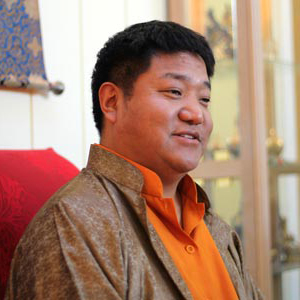
Pristine Mind Silent Meditation, M, W, F 6-7 pm
Pristine mind silent meditation is an objectless, guided meditation practice from the Vajrayana and Dzogchen traditions of Buddhism that has been and continues to be taught at Saraha by Tibetan Buddhist master Orgyen Chowang Rinpoche, the spiritual director of the Pristine Mind Foundation. Practice (brief introduction available for those arriving early) on Mondays, Wednesdays and Fridays from 6-7 pm. For more information these events click here...
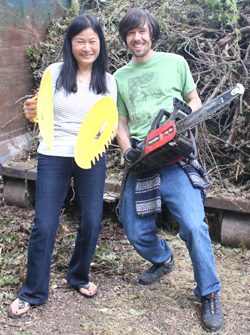
Saturdays Volunteer Work at Saraha, 10 am - 1 pm
That's right, hands-on volunteer work is a very excellent way to do Dharma practice. It is also a great way to get to know the place and people of Saraha Institute. Work assignments include flower arranging, shrine decoration and cleaning, painting, landscape and light construction work, tasks which vary by the season as well as the skills and level of enthusiasm of volunteers who show up. You do not need an appointment to come, just come and there will be something for you to do. Visit the volunteer pages HERE...
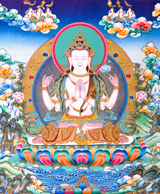
Sundays Chenresig Compassion Practice, 1-3 pm
Compassion, the altruistic intention to free all beings from suffering, is something that Buddhist practitioners always need to learn, practice, remember, renew, stabilize and grow. At Saraha we try to remind ourselves of this especially with Sundays Chenresig Compassion Practice (Sundays 1-3 pm), which takes the form of reading from the endlessly lively and inspiring life story of the great Buddhist master Thangtong Gyalpo, and then reciting the practice "For the Benefit of All Beings, as Vast as the Sky," which includes the visualization of Chenresig, the Buddha of Compassion, and the blessing of all beings. For an audio teaching on compassion, "The Play of Compassion," by HE Dzongsar Khyentse Rinpoche, click here...

"First Mondays" Orientation Meetings, 6-7 pm
Are you interested in knowing more about Saraha? We will usually conduct 30 minute orientation meetings for new students and curious people on the evening of the first Monday of each month. Check our calendar for a schedule of these events. Open to the public, drop-ins welcome.
Monthly Practices of the Buddhas
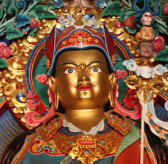
Guru Rinpoche Day Practice
Guru Rinpoche, or Padmasambhava, is the Enlightened teacher who entered Tibet from India in the 8th century AD and led Tibet's initial conversion to the Buddhist doctrine. Celebrated monthly on the 10th day according to the traditional Tibetan lunar calendar, Guru Rinpoche Day practices include the standard evening meditation practices with the addition of the "Shower of Blessings" Tsok or assembly practice, composed by the Tibetan Bodhisattva Jamgon Mipham Rinpoche. These monthly practices were stipulated by Guru Rinpoche as a specific means for his followers to celebrate and uphold his tradition, now known as Nyingma tradition of Tibetan Buddhism..
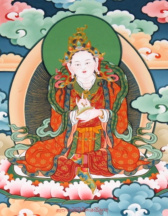
Dakini Day Practice
Enlightened Dakinis are manifestations of Buddha appearing in feminine form. Dakini Day practice is undertaken on the 25th day of each month according to the traditional Tibetan lunar calendar. These practices will be either the same as the Guru Rinpoche day practices, which equally address all manifestations of enlightenment, or alternately a practice related specifically to a female form of Buddha..
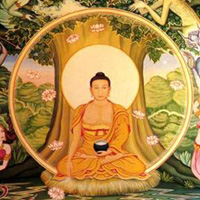
Shakyamuni Buddha Day Practice
Shakyamuni Buddha Day, celebrated monthly on the day of the new moon, or the 30th day of the month, according to the Tibetan lunar calendar. Practicing prayer and meditation towards Shakyamuni Buddha, has infinite benefits, but particularly addresses the sufferings of war, contention and strive. On Shakyamuni Day at Saraha, we practice recitation of Buddha Puja by Mipham Rinpoche.
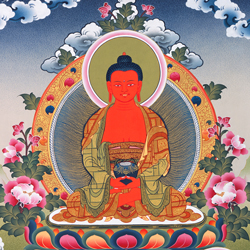
Amitabha Buddha Day Practice
Amitabha Buddha Day, celebrated monthly on the day of the full moon, or the 15th day of the month, according to the Tibetan lunar calendar. Practicing prayer and meditation towards Shakyamuni Buddha, has infinite benefits, but particularly addresses the sufferings of famine, deprivation and want. On Amitabha Buddha Day at Saraha, we practice recitation of Buddha Puja by Mipham Rinpoche.
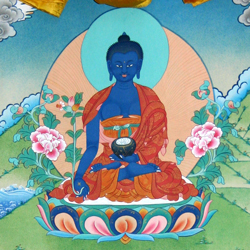
Medicine Buddha Day Practice
Medicine Buddha Day, celebrated monthly on the day of the new moon, or the 30th day of the month, according to the Tibetan lunar calendar. Practicing prayer and meditation towards Shakyamuni Buddha, has infinite benefits, but particularly addresses the sufferings ofillness and disease. On Medicine Buddha Day at Saraha, we practice recitation of Buddha Puja by Mipham Rinpoche.
Annual Practices of the Four Great Festival Days of Buddhism
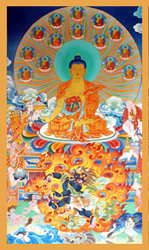
The Anniversary of the Buddha's Manifestation of Miracles (Chotrul Duchen)
Celebrated on the full moon (the fifteenth day) of the first Tibetan lunar month, this holiday celebrates the culmination of the fifteen day period where the Buddha, in order to increase the faith of his disciples and silence his critics, performed a different miracle on each day. On this day, we will do our regular evening practice, with the addition of the Buddha Puja, composed by Jamgon Mipham Rinpoche.
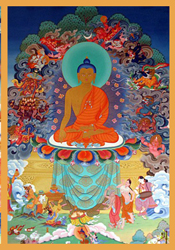
The Anniversary of the Enlightenment and Parinirvana of the Buddha (Saga Dawa Duchen)
Celebrated on the full moon (the fifteenth day) of the fourth Tibetan lunar month, this holiday celebrates the anniversary of Buddha Shakyamuni's Enlightenment, as well as his Parinirvana. On this day, we will do our regular evening practice, with the addition of the Buddha Puja, composed by Jamgon Mipham Rinpoche.
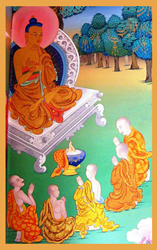
The Anniversary of the Buddha's First Turning of the Wheel of Dharma (Chokhor Duchen)
Celebrated on the fourth day of the sixth Tibetan lunar month, this holiday celebrates the anniversary of Buddha Shakyamuni's first teaching, or "Turning of the Wheel of Dharma," following his Enlightenment. On this day, we will do our regular evening practice, with the addition of the Buddha Puja, composed by Jamgon Mipham Rinpoche.
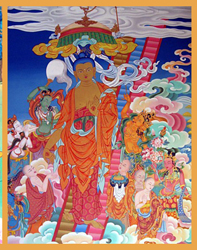
The Anniversary of the Buddha's Descent from the Heavenly Realms (Lha Bab Duchen)
Celebrated on the twenty-second day of the ninth Tibetan lunar month, this holiday celebrates the anniversary of Buddha Shakyamuni's descent, and return to Earth, from the heavenly realms, where he had gone to teach and guide the reincarnation of his mother, Mayadevi, who had been reborn there. On this day, we will do our regular evening practice, with the addition of the Buddha Puja, composed by Jamgon Mipham Rinpoche.